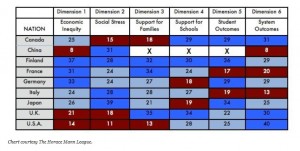Click to enlarge.
Dear Commons Community,
A new report out earlier this week from the Horace Mann League, a public education advocacy group, and the National Superintendents Roundtable, a community of school administrators, argues that more than just test scores should be taken into consideration when comparing countries’ education systems. In the report, researchers look at 24 indicators in six categories — student outcomes, school system outcomes, social stress, support for families, support for schools and economic inequity — in order to evaluate the educational success of nine countries. As reported in The Huffington Post:
“Study authors compare school systems in the G-7 nations, seven of the world’s largest economies — the United States, Canada, France, Germany, Italy, Japan and the U.K. — writing that it is “important to draw comparisons among nations that are as similar as possible.” Authors also include Finland and China “due to global interest in the educational performance of their students.”
“The goal was to look at the whole iceberg, not just the tip — and provide a clearer snapshot of each country’s performance, including its wealth, diversity, community safety, and support for families and schools,” Gary Marx, president of The Horace Mann League, said in a press release.
Comparison results were bleak for the United States. While the U.S. is the wealthiest nation in the report and has an exceptionally well-educated adult population, the study found high levels of economic inequality, low levels of support for families and higher levels of social stress than any other country examined. Countries’ levels of social stress were measured in the report based on factors such rates of violent deaths, death from drug abuse and teen pregnancy.
“With respect to social stress, the indicators suggest the U.S. has the highest rates of deaths from violence and substance abuse, and that American society is 13 to 16 times more violence-prone than other nations in this study,” the report said”
An excerpt of the Executive Summary says it all:
“To often…policymakers, educators, and the public are inclined to narrow their focus to a few things that are easily tested.
They become captives of the results and their goal becomes raising test scores rather than developing fully educated people. To avoid that mentality, the Horace Mann League and the Roundtable want to emphasize the power of a consistent and comprehensive framework that looks at all the measures involved in shaping our future citizens.”
Tony


